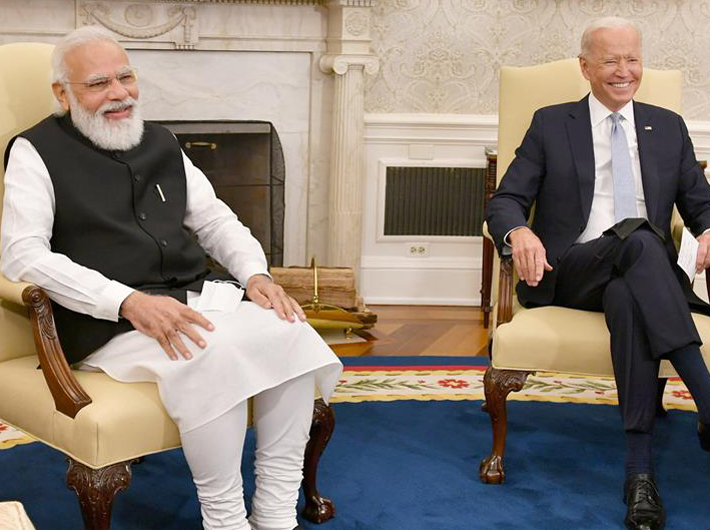Experts believe the course of international relations defined during the past ten years will continue
Prime minister Narendra Modi has strived incessantly to bring laurels and much needed recognition for the nation since May 2014 when he was sworn in as the head of state. The poser which can be deliberated upon is this: What will be the consequential impact of the new era of coalition politics which confronts us after two terms of the Modi denomination? It’s a well benowest and established trend that there are internal determinants of foreign policy which include political, societal and economic. Earlier on, in Modi 1.0 and Modi 2.0, the electoral girth lay with the prime minister, so he could engage the entire ecosystem of states with the Indian dream and its attendant rise. It is thus that ‘Bharat’ was depicted substantially as the preeminent ‘Vishwaguru’ and ‘Vishwamitra’. The big question now is that in the initial parleys of Modi 3.0 can the swansong supporters of a 240 strong Bharatiya Janata Party be loyal and consistent in their political support to the new dispensation in New Delhi? Both Nitish Kumar and N. Chandra Babu Naidu have assured Narendra Modi that their tireless and unflinching support lies with the prime minister along with the NDA alliance.
The poser which they now come up with and what the entire hoi polloi of the nation is talking about is the forecasted impact of coalition building on India’s foreign policy. Ambassador Ashok Sajjanhar has written in First Post that most of the foreign policy decisions and standpoints will remain the same, which include the Indian standpoints on the Russian invasion of Ukraine along with the contemporary vitriolic context of the Israel and Hamas conflagration. The manner in which New Delhi took a no nonsense stance on the Russia-Ukraine conflict and the way in which New Delhi accused the Hamas of being the spoilsport in the peace applecart of West Asia, could be achieved as landmarks only because the numerical strength and one-uppance of BJP in the NDA, especially in the 2019 furlough. Also, the Uri and Balakot incursions could happen along with the clamour on Pakistan-Occupied Kashmir and the activism on Baluchistan, too. Thus, in a manner, the aggressive, muscular and proactive diplomatic veneer of New Delhi could be attempted due to the numerically singular majority of BJP. Some scholars and observers are casting aspersions on the persistence and the potency of India’s foreign policy in the context of the crutches which confront the New Delhi dispensation, electorally.
It is being contested that some of the coalition partners being socialists, the liberal strain of nation’s diplomacy and its underlying realism vis-à-vis its arch antagonists might face confrontations from the lesser NDA flocks because of their differing ideologies and networked rationales. There is no political and diplomatic bad blood between Narendra Modi and Nitish Kumar and the theme of intertwined national interest will see an amalgamated and cohesive NDA. Nitish Kumar in his address in the NDA meeting has already very emphatically assured the saffron fold that his party will abide by all judgements and decisions of the Modi Regime.
Business Standard reports that, “Experts believe that a coalition government at the Centre, with no single party getting a majority in the Lok Sabha for the first time in 10 years, may not prove to be a roadblock in meeting the foreign policy challenges India faces, including the need for a broader engagement with China and resumption of ties with Pakistan. Apart from a possible reassessment of ties with China and Pakistan, experts feel that foreign policy continuity is likely even under a coalition government.”
It can be discerned by early hurly burly of bonhomie in a coalition NDA, that PM Modi will find it smooth sailing while striving to stabilise India in strategic tightropes and while grandstanding with the greater powers.
Former foreign secretary Shyam Saran’s opinion and assessment on the impact of the coalition for the BJP, which has nevertheless won the seat of high power once again in the Raisina Hill, is worth considering. "India needs to find a new equilibrium in its ties with China, which will be challenging since it is Beijing that has changed the status quo at the Line of Actual Control. My understanding is that a possible re-engagement with Pakistan was also being considered in New Delhi even before the general elections. This is the right time to start talking to Islamabad given the security and economic challenges it is facing,” he is quoted as saying in the Business Standard report.
In a manner of updates, the grandstanding might recede to the background in the longer run but the Indian power projection will persist in the realm of its international and bilateral partnerships. All said and done, it can be safely presumed that New Delhi will gravitate towards a stature as a great power while taking into account the nags and strains of coalition partnerships. The return of Dr. S. Jaishankar to the external affairs ministry signals the same continuity.
Dr. Manan Dwivedi is Faculty, International Relations and International Organizations, IIPA.


